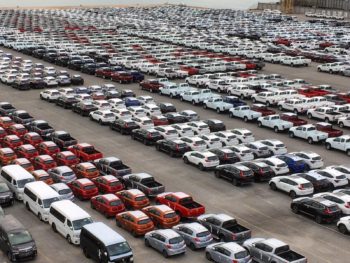Fleet registrations fall for fifth month running
Fleet and business registrations declined for the fifth month in a row in January, leading to renewed calls for supportive taxation policies.
The latest figures from the Society of Motor Manufacturers and Traders (SMMT) show that demand from fleet buyers fell 3.4% last month to 86,559 units while the sub-25 ‘business’ registrations segment was down 33.5% to 3,076 cars. In contrast, private registrations actually rose 2.9% but the increase was not enough to offset the fleet downturn and the overall market dipped 1.6% to 161,013 units.
However, there was some good news for alternatively fuelled vehicles, with registrations up 26.3%, resulting in a total 6.8% market share. Petrol demand also grew in January, up 7.3%, but this was not enough to offset another month of decline for diesel, as registrations fell 20.3%.
The overall new car downturn has renewed calls for the Government to support buyers, especially fleets looking to move drivers into the latest cleaner vehicles.
Mike Hawes, SMMT chief executive, said: “To restore momentum, we need supportive policies, not least on vehicle taxation, to encourage buyers to invest in new, cleaner vehicles that best suit their driving needs – from the latest petrols and diesels to an ever growing range of exciting electrified vehicles. This would be good for the environment and good for the industry and those who depend on it.”
His comments come as fleet industry experts urge the Government to take a fair and balanced approach in its review into whether revisions to Company Car Tax and Vehicle Excise Duty are required as a result of the shift to WLTP. The introduction of WLTP has already brought disruption to new car sales and fleet cycles, not helped by a continued lack of insight on future fleet taxation, and initial evidence provided by manufacturers suggests that more than 50% of cars will see an increase in official CO2 emissions from NEDC to WLTP of between 10% and 20%, bringing major cost increases for drivers through BiK and for fleets through VED and National Insurance contributions (NICs). In response, ACFO has said that the UK needs a simple and fair tax system that gives drivers a degree of longevity “but also some protection from the increases we have seen as part of the migration to WLTP”.
The SMMT figures also bring added weight to calls for the Government to avoid a no-deal Brexit to ensure that drivers as well as manufacturers are not hit by added costs. Research firm LMC Automotive has indicated that as the UK imports most of its cars, prices would inevitably rise with the further devaluation of the pound after a no-deal Brexit. The firm also said that the very likely imposition of tariffs would only compound the negative effect on demand.
Commenting on the latest SMMT figures, Seán Kemple, director of sales at Close Brothers Motor Finance, said: “These figures, and recent news from Nissan in Sunderland, highlight the damaging effect of uncertainty on the industry. The entire sector is screaming out for a resolution, with all eyes on Parliament in the hope of some clarity on the way forward. Until we have this, the current scene is set to stay.”













